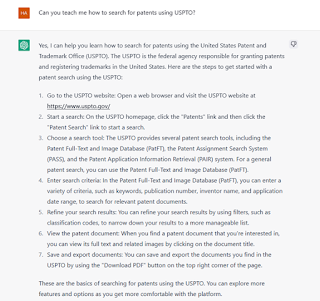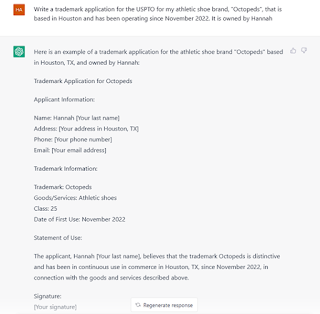Given the massive amount of attention OpenAI’s new chatbot, ChatGPT, has received (especially as a harbinger of the imminent AI takeover), I thought I'd test its performance as a PTRC representative. So, I spent a recent rainy afternoon formulating questions and interrogating ChatGPT's abilities. I was relieved to find my immediate replacement is not likely, but I should still watch my back.
ChatGPT generated fairly accurate, if brief, instructions on how to search for patents on Espacenet, with or without a given topic.
 |
| Basic steps for searching with Espacenet |
However, it has not yet learned about the USPTO’s Patent Public Search. When I asked for Patent Public Search Advanced instructions, I was directed to the WIPO. Though the instructions seemed fine, PATENTSCOPE and Patent Public Search were both misidentified.
 |
| Instructions for WIPO, not USPTO |
I rephrased the question to stipulate a USPTO search tool, and was extremely reassured to find ChatGPT still thought PatFT and AppFT were available. I have a year's advancement beyond the AI. Of course, I took a moment to provide feedback and inform OpenAI that the answer was incorrect.
 |
| Wrong tools, right agency |
ChatGPT is completely incapable of performing a patent search. When I requested both general and more specific patent searches, it responded with an unequivocal “No!” (if in more polite terms). Even when asked to find basic information on granted patents or patent data, like how many patents were issued to Rice University in 2022 (17), it could not answer.
 | |
| CharGPT cannot provide patent data |
I followed up with an easier search, asking for the grocery store nearest to Rice University, which caused several errors. Later, it managed to locate a Randalls—with the exact same address as Rice.
This is gratifying. I’ve been telling people for years that the searching abilities of librarians are irreplaceable, and AI has a very long way to go before it can try.
Following that, I changed topics, and asked general and specific questions about trademarks. I was surprised when ChatGPT immediately provided instructions for obtaining a trademark in Togo, the smallest country that first came to mind. Other basic questions, such as “Does Rice University have trademarks?” were also easily answered.
 |
| How to obtain a trademark in Togo |
Questions about specific entities, trademarks, searching, or data were not possible. ChatGPT could not tell me what Rice’s first trademark was, or how many trademarks Rice University’s athletics department has. I anticipated as much from roughly similar types of patent queries.
 |
| ChatGPT is also uncertain about trademark data |
Lawyers may be in bigger trouble than librarians. ChatGPT generated two fairly plausible examples of a patent content, one using its own example and one using mine. They were incomplete, and included substantial warnings about relying on an AI and the advisability of seeking legal counsel, but still composed some sections. I imagine an inventor could input enough information about a real innovation and receive a fairly helpful set of claims or descriptions.
 |
| The first part of an example patent document |
 |
| Warning provided for all patent document examples |
Next I asked for trademark applications, first with no information beyond brand name, and then with additional details like product and business location. The more details provided, the better the application--to an extent. The content was very generic and left many blank spaces to be filled, but it managed to correctly classify the product (athletic shoes, 25).
 |
| Example trademark application with less information |
 |
| Example trademark application with more information |
ChatGPT noticeably didn’t make any distinctions in application content for any IP office, and definitely did not consider type of mark or mark specifications. Again, similar to patents, it produced something that could guide a person struggling to write a trademark application.
I’ll keep an eye on it, though, and let everyone know when I’m being replaced by an online, open-source AI chatbot.
No comments:
Post a Comment